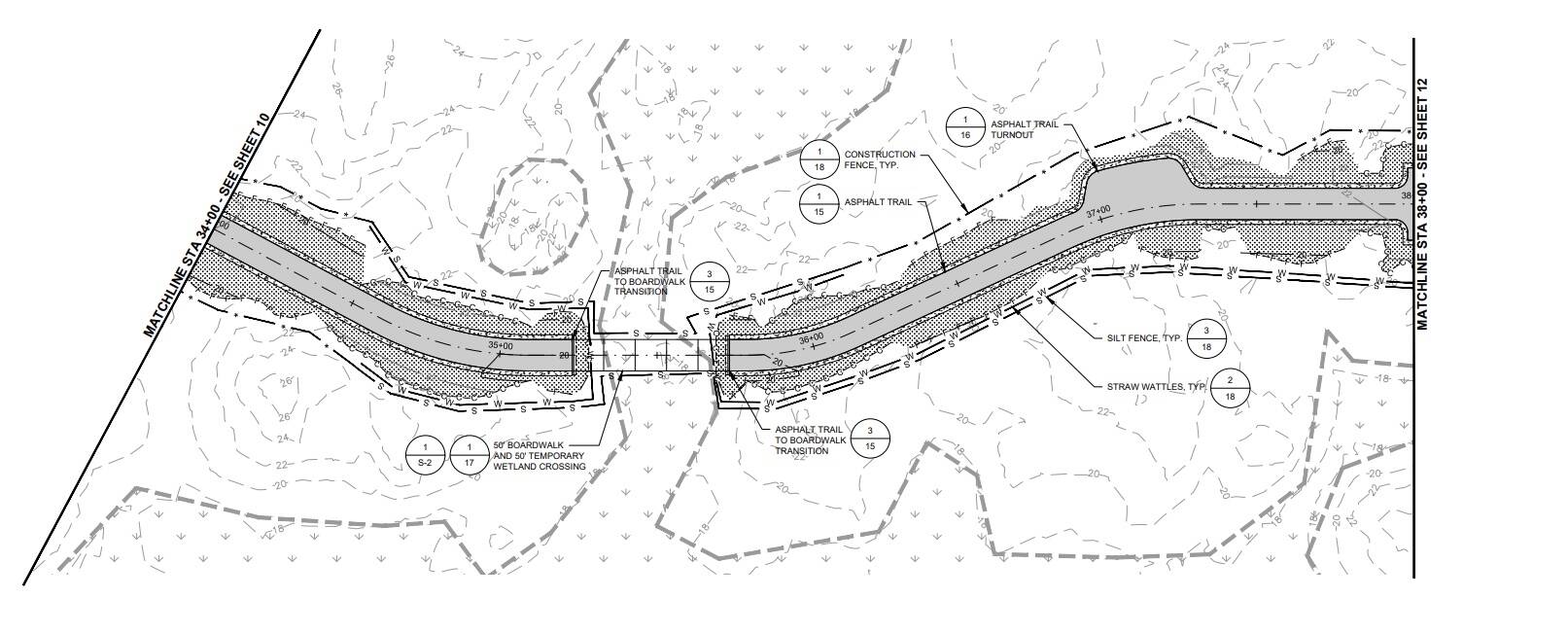The city of Ocean Shores opened bids Jan. 19 for the High Dune Trail, with the lowest coming in at under a million dollars, putting the city one step closer to breaking ground on the highly-anticipated project.
The city has been working since 2019 to secure funding for the trail, which was a passion project of late-mayor Crystal Dingler. The trail will be a paved, wheelchair-accessible walking and biking path stretching from Damon Road to West Chance a la Mer, and will likely provide a major tourism draw for the city, according to city officials.
City Administrator Scott Andersen said he was surprised and pleased both by the number of bid submissions and the dollar amount attached to them. Seven bidders vied for the project with bids ranging from just under a million dollars to over two million dollars.
The two lowest bids were a $981,000 quote from Brumfield Construction and a $1.08 million offering from Rognlins Inc.
Funding for the trail comes from multiple sources, including roughly a quarter-million dollars from the city budget, which was allocated in 2019, about $277,000 from the Cowlitz-Wahkiakum Council of Governments, and Washington Department of Transportation grants, according to the city’s grant writer Sarah Bisson. About $1.2 million is allocated for the project.
Although several bids came in below that number, Bisson said she didn’t anticipate having leftover funding because of additional items like benches, trash cans, interpretive signage and the cost of an onsite inspector.
Andersen said the project’s design consultant, Gray and Osborne, is working toward tabulating the bids and ensuring the math with each bid is correct. WSDOT will then review the bids and confirm they meet certain requirements, a process expected to take two weeks, Andersen said.
One of those requirements is the project’s Disadvantaged Business Enterprise percentage, or DBE. Contracts that use federal funding through state transportation departments must allocate a certain amount of the work to businesses with DBE certifications — small businesses owned and controlled by socially and economically disadvantaged people.
Since the High Dune Trail is funded with federal dollars through a WSDOT grant, contracts must meet certain DBE criteria, which in this case is 16% of the contract.
Once WSDOT gives its stamp of approval, the lowest qualified bidder, including the bid’s entire tabulation, will be presented to the council, Andersen said.
The council’s approval should set up the city and contractors to begin construction in June, Andersen said, when the city will hold a groundbreaking ceremony. A three- to four-month projected construction period should finish up around the beginning of October.
Ocean Shores Mayor Jon Martin said the bid opening process was “exciting” given how long the city has been working toward construction of the trail.
In November, Martin signed a $2,800 land use easement granting the city access to a 200-foot parcel of land in front of the Lighthouse Suites Inn near Damon Road. Before the agreement, unproductive negotiations surrounding the right-of-way issue had held up the project for over six months. The city passed an ordinance authorizing pursuit of eminent domain of the land parcel, although no eminent domain action was necessary.
The pandemic also halted action on the project with rising construction costs. That forced the city to acquire additional funding.
“It was a battle from day one all the way through,” Andersen said.
The trail will be a 10-foot-wide asphalt path stretching for 3,900 feet in length. Part of the trail — sections that pass over wetlands, an area totalling 335 feet — will be boardwalk. Bisson said the trail should disperse congestion on the beach and allow for ADA-accessible beach recreation.
While this summer’s construction will only reach to Chance a la Mer beach access, Andersen and Bisson said the city has plans to implement a second phase of the project that will extend the trail farther south. Andersen said original ideas for the trail included the second, more southern section, but the city chose to break it up into two parts to make funding and planning more manageable.
Completion of the first phase will also make it easier to secure funding for the second phase, Andersen said.
Contact reporter Clayton Franke at 406-552-3917 or clayton.franke@thedailyworld.com.



